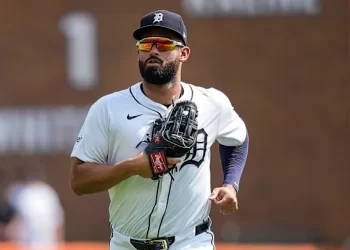By: Zachary Draves
The concept of giving people second or even third chances is rooted in the belief that anybody can be redeemed. They can make a mistake, take ownership of it, learn from it, and move forward with a strong sense of redemption rooted in genuine self-accountability.
However, there are always exceptions to any rule.
At a certain point when somebody is a repeat offender and has demonstrated themselves to be someone who lacks any sort of perspective on the severity of their actions, then typically there is no other option but to cut that individual loose.
This is where Los Angeles Dodgers pitcher Julio Urias comes in.

On Sunday night, the 27-year-old was arrested and charged with felony domestic violence. The Los Angeles Police Department (LAPD) didn’t release any details, but did say that the alleged incident occurred at BMO Stadium where he was watching soccer star Lionel Messi as Inter Miami played LAFC.
After being booked, he was freed on $50,000 bond and is set to appear in court on September 27th.
The Dodgers released a statement on X formerly Twitter saying “We are aware of an incident involving Julio Urías. While we attempt to learn all the facts, he will not be traveling with the team. The organization has no further comment at this time.”
The MLB has yet to release a statement, but an investigation will likely ensue.
This is also not the first time for Urias.
In 2019, he was arrested on suspicion of domestic violence after witnesses say they saw him push a woman to the ground outside a shopping mall parking lot. He was then suspended for 20 games for violating the league’s domestic violence policy, the LA city attorney’s office ordered him to complete a 52 domestic violence counseling program , and committed himself to not engage in any further acts of violence for the next year.
While the facts of this recent matter will certainly unfold, one thing that can be established is that Urias possibly possesses the qualities of a typical repeat abuser. Therefore, he should not be anywhere near the Dodger organization as they are on the brink of clinching the NL West division title and securing a seventh consecutive playoff appearance.
Domestic violence doesn’t tend to be a singular isolated incident. It happens in what is called a cycle of abuse that occurs in three stages: tension building, an abusive incident, and the honeymoon phase.
The tension-building stage is where the perpetrator creates an atmosphere where the victim feels like they are walking on eggshells, trying to not say or do anything that would set their abuser off. Then comes the act of abuse that can be physical, sexual, verbal, emotional, psychological, or all of the above. Shortly thereafter, the perpetrator engages in the honeymoon period where they shower the victim with love and affection under the guise of supposed remorse and with a promise that it will never happen again.
While undergoing the 52-week counseling program, Urias entered into that honeymoon stage with a perceived commitment to change. He said at the time that he had “taken proactive steps to help me grow as a person on and off the field, and in my relationships.”

Fast forward four years later and that cycle has clearly not been broken.
The best thing that the Dodgers and MLB can do at this point is to terminate him. Even without specifics, there was certainly enough to arrest, book, and charge him again. Keeping him for whatever reason would be more than just simply sending the wrong message.
The Dodgers have all the tangibles needed to make yet another great run in the postseason and potentially win their second World Series in four years. They don’t need an alleged repeat domestic offender who blew the second chance that was given to him and who also has struggled this year compared to where he was last year with an 11-8 record, 4.60 ERA, and who gave up 24 home runs in 117 1/3 innings pitched.
It’s time to break the cycle.
If you are in an abusive relationship and are in need of anonymous and confidential help please call the 24/7 National Domestic Violence Hotline at 1-800-799-7233 (SAFE) or 1-800-787-3224 (TTY). If you are in immediate danger, call 9-1-1.


 NFL
NFL





